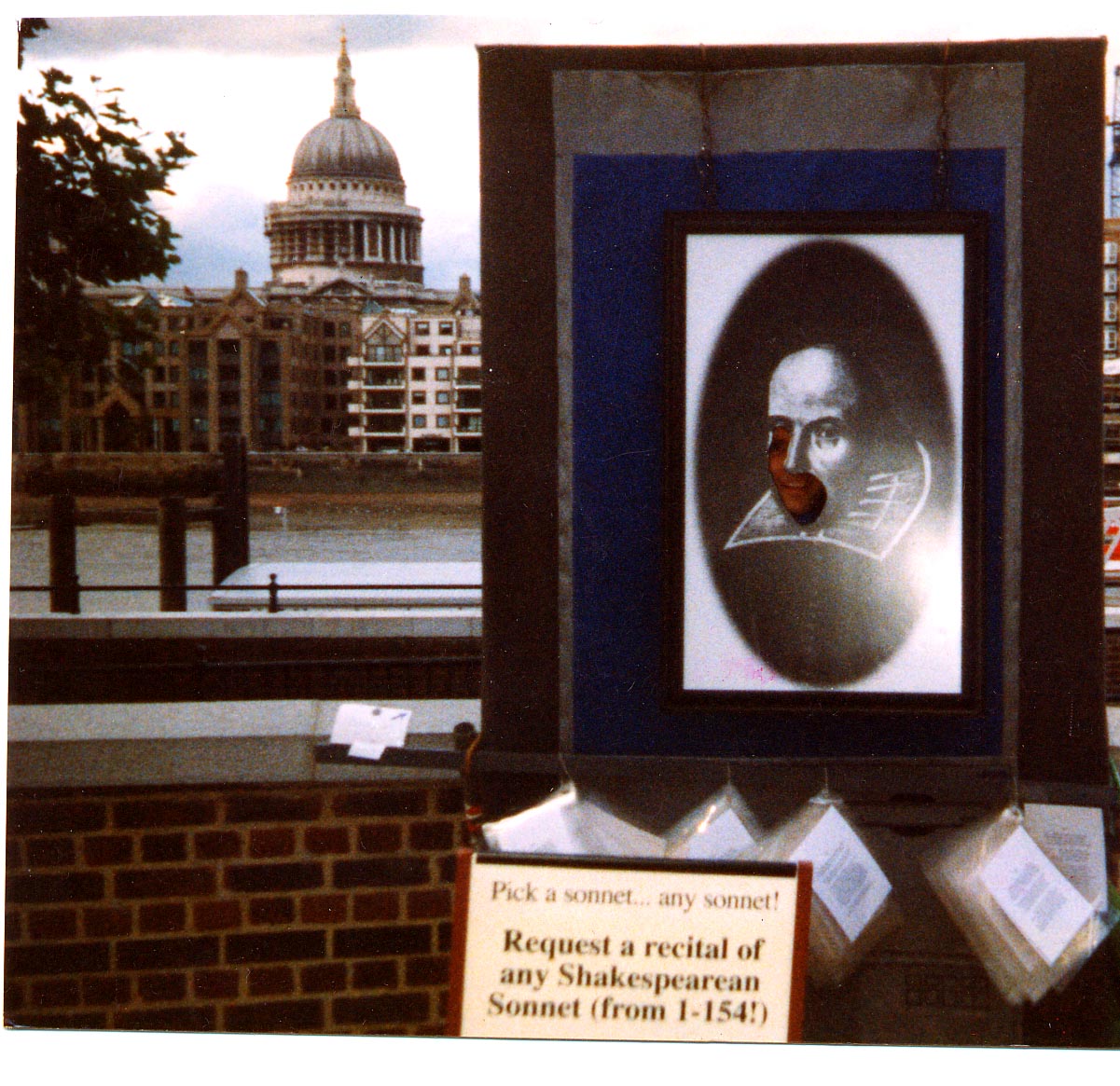A dozen years ago I directed the one-act ‘The Dark Lady of the Sonnets’ by G. B. Shaw for the Leiden English Speaking Theatre at the Festival of English Theatre Societies (FEATS) Trophy for Best Overall play. Prince Laurents of Belgium handed me the trophy.
|
||||||
|
…aka classical climate theory: an ancient racialism ingrained in our thinking through the influence of intuitive humoral psychology. Sh’s generation recorded the falling from grace of this particular theory. Nowadays you’ll find it in your horoscope in any newspaper. Thin body types are secretive, fat types are jovial, medium build types are adventurous. Now apply this same reasoning to climate. Dark types are lusty and passionate and wise, white types are aggressive and dim-witted. To think the northern white man was once the outcast of the human races, struggling to find its place in the histories of civilizations. An upstart crow if you will. Boy how times have changed. Read a review here of Mary Floyd-Wilson’s book Graphic novel fans should try this new site entitled Kill Shakespeare, pitting his villains against his heroes! Several weeks later, the graphic novel is released and reviewed to content and discontent. Yesterday I came across this brilliant website based on Van Gogh’s letters. Now i love Vincent as much as our Will, just in a different way. I even have voice-overed Vincent’s Brother Theo in English at the Van Gogh Huis in Zundert. But hey, enough about me…
Song text by Jonathan Richman. Who can forget Don Maclean with his song ‘starry starry night’? And finally Bob Dylan. All these artists songs can be heard on this blog. So today i’d like to show how Van Gogh was a Stratfordian.
Reminds me of sonnet 24: Here’s Vincent comparing Sh to others, in a letter to his brother Theo September, 1880:
A year later another letter to Theo in Dutch:
Then again about portraiture to Anthon Rappard in 1881:
For the curious you can see what Vincent missed with Menzel’s Sh portrait here. Vincent writing to his brother in 1889 thanking him for buying him a Shakespeare edition:
Finally Vincent writing to his brother and sister in 1889:
Ah yes the quotes: ‘You few that lov’d me, The manipulative Cardinal Wolsey (1471-1530), Archbishop of York, loses his wealth and power when his crimes are revealed. He forfeits his royal protection and is attacked from all sides. Full of remorse, Wolsey addresses his servant with great emotion (act 3, scene 2): ‘And when I am forgotten, as I shall be, See Henry viii. Ed. R.A. Foakes. 3th ed. London 1957, pp. 55, 124. Ah Reggie Foakes, another day another blog! Approaching six thousand readers. Thank you for reading. OK maybe three thousand are me, but that still leaves 3,000. Why that’s the capacity crowd of the Globe Theater. The old one then. It is a commonplace of blogs to mourn the lack of readership. But then why do it? It is because you read and that, dear readers, is an ephemerally dangerous thing for both of us. Reading exposes you to ideas. Any one of those ideas can change your life. Alternatively those ideas can confirm what you already know, or think you know. Some people don’t like to read, others’ fetishise it. Some like fiction some like non-fiction. Some like fantasy, others’ reality. Not everyone likes to write. Writing is confrontational. The writer is the most tortured of all souls. Total gules! ‘Why is my verse so barren of new pride, (now tell me the writer didn’t think about that word ‘variation’ ie 3 or 4 syllables followed by Why with the time do I not glance aside, (Surely this a statement of how the writer sees his own writing style. Similar to the advice Hamlet gives to the actors)? (I see an anagram of “Hey, I is Will, not Vere” in that first line. That every word doth almost tell my name, (Note the rime word ‘pro-ceed’ with ‘weed’! Sh was ‘for-seeds’! Meaning he was a grower. “Let me grow” is hidden in anagram in these lines)! O know sweet love I always write of you, (A perennial argument for poets and musicians, as the rock band The Who would ask centuries later: who are YOU)? So all my best is dressing old words new, (So words are like fashion, clothing his poem with old and new, For as the Sun is daily new and old, (Are you telling us or asking us? Does this mean you’re going shopping again? Can I have my credit card back)? …here are the Shakespearean sonnets one should cover according to the Ivy League: Allow me to read them for you. …More and more YLS is leaning toward the Catholic Sh. I’d never heard of this writer before today but will be sure to get his book and peruse. Joseph Pearce is a former skinhead turned Catholic. Regardez his website here. Add to that the amazing website of shakespeare’s sonnets, while we’re linking, and ‘ave a butcher’s at the Carrier’s Cosmography a coach guide for London circa 1637 and the close-up pictures of London Bridge back in Sh’s day. The above is maintained by Oxquarry Books Ltd. Many thanks for all the links they provide. What follows is from G. a fellow student in my class at the Shakespeare Institute, which sums up our conclusions then and now on the biography of Sh.:
And yet we both remain Stratfordians! …aka Sh’s greatest creation: Hamlet. Who doesn’t know Hamlet? His line is probably the most quoted and quotable on the planet, I’ll start you off: 2b… Every actor wants to play Hamlet, read the poem here. This Boxing Day the BBC showed RSC director Gregory Doran’s made for TV version. Dr Who played him this year on his crossover to Hollywood fame and fortune. Supported by Captain Jean Luc Picard doing a double of Claudius and Hamlet’s father. What is Hamlet’s father’s first name btw? Now YLS loves Hamlet and intermittently tries to learn all his soliloquies just because. Ergo watching the play is to join in the longest role as if it’s a karaoke event. And I know I’m not alone in this. But thinking too closely on Hamlet is like to drive one mad. The timeline (would to heaven Sh used the Unities on this one), his madness (feigned or no), Ophelia (weepy helpless victim or no), his father’s ghost (real or contrived. Catholic or Protestant), his mum’s behaviour (Royal slapper or dizzy alcofrolic), his age (angst-ridden teen or dithering thirty year old), Rozencrantz and Guildenstern (good mates or royal sponges), Horatio (who is this guy), etc etc. What stood out this time through were several words like matter and custom. And the bird metaphors nestled in the Osric scene especially: chough, lapwing, sparrow. Oh yes and the ironic parallel between Hamlet not killing Claudius while he was at prayer and Laertes assertion that he would be revenged on Hamlet, as his father’s son, and in deed undertake All Hamlets’ are never the true Hamlet. There are always changes and cuts made in the text. And then again which text do we refer to? (don’t go there on an empty stomach). The plot furtherance of posioned swords in a duel is talked of while Hamlet is on his way to be executed in England. No matter! The stupidest thing Hamlet says in the play is But no matter! Hamlet is Hamlet, and he is mad and sent into England where the men are as mad as he. Let be. ..the Times of London reports on our Will’s possible trip to Rome during his so-called Lost Years. Whatever the truth of this one I love it. And here’s the article in case pressing the link is too much effort:
…apparently some diplomatic wags made this one up when discussing Kaiser Wilhelm’s forays into peace making on his extreme eastern front. I derived it from the book titled ‘The Orientalist’ sub-titled ‘Solving the Mystery of a Strange and Dangerous Life’ by Tom Reiss. He is seeking the eventful history of Kurban Said, aka Essad Bey aka Leo Naussimbaum. We trace his origins in Baku, the oil rich capital of Azerbaijan, and his subsequent escape and wanderings as a stateless refugee. It makes fascinating reading about the revolutionary shiftings of the times in which he lived. So many things we Western Europeans never even broach in our histories. I feel closer to understanding why Stalin and Hitler came to power, as he outlines the horrific events that prompted their rise. The link to our Bard is tenuous yet important to sticking it to one of conspiracy theorists’ perennial arguments. The fact that Shakespeare’s family (excluding Gilbert whose signature we have) were illiterate. Illiteracy does not mean you have no soul, no poetry. So what John and Mary Shakespeare and Shakespeare’s wife and daughters were illiterate. Words arise in the heart and soul of a person and for many thousands of years their transmission was oral. Tongues speaking what the heart and mind desired. Illiteracy does not mean you lose the power to think and articulate ideas. Or that you are cut off from ideas that are transmitted by books, a simple e.g. the Bible. Reiss describes on pages 94-95 of Leo experiencing the last of the “poetry contests” that illiterate peasants would hold in village after village, which came to represent (for him) everything noble about the Caucasian culture. These contests were native to the Caucasus and Persia and thousands of years old. In exchange for gifts, treats, and affection, they would compose verses on the spot and could recite something pious or obscene on the spot. There were no restrictions of rank or wealth: only skill counted. The contestants would face off on an open square and face off in every genre. Often the audience would suggest a theme, and the poets would improvise on it. Leo’s most famous description is in his book ‘Ali and Nino’. The competitors dressed in silken robes, strut in front of the crowd, eyeing each other suspiciously, until one lets loose a volley of verse:
(this opening salvo is reminiscent of the dissing contests of modern day rappers).
Now i am not suggesting for a minute that Elizabethan poetry (or rap) is influenced by Eastern poetry contests. Though let’s not forget many an Englishman and European had passed, like barbarian hordes, through these lands on the 3 crusades; slaughtering Christian and Moslim alike. But the truth is that illiterates can have poetry in their soul. If it is true for illiterate Caucasian peasants, it is equally true for the rising Elizabethan middle classes. Truth and facts, as Leo complains later in this book, are two completely different things. And truth is the higher of the two.
|
Look and Listen to OthersOnline Works of Shakespeare
Play SchoolRenaissance School
Scholarly Renaissance-related blogsShakespeare Blogs
Shakespeare Institutions
Shakespeare or SOMEONE ELSE?
Sonnet School
|
|||||
|
Copyright © 2025 I Love Shakespeare - All Rights Reserved Powered by WordPress & Atahualpa |
||||||


 St Paul’s in the background. Willl in the foreground on the Bankside, on the Globe Piazza.
St Paul’s in the background. Willl in the foreground on the Bankside, on the Globe Piazza.